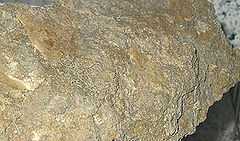Evenkite
| Evenkite | |
|---|---|
|
Evenkite from Dubnik, Slovakia | |
| General | |
| Category | Organic mineral |
| Formula (repeating unit) | C24H50 |
| Strunz classification | 10.BA.50 |
| Crystal symmetry |
Orthorhombic dipyramidal H-M symbol: (2/m 2/m 2/m) Space group: Pbcm |
| Unit cell | a = 7.47 Å, b = 4.98 Å, c = 65.85 Å; Z = 4 |
| Identification | |
| Color | Colorless or pale yellow |
| Crystal habit | Tabular pseudohexagonal crystals, granular, disseminated |
| Crystal system | Orthorhombic |
| Twinning | Polysynthetic |
| Cleavage | {001} Perfect |
| Mohs scale hardness | 1 |
| Luster | Waxy |
| Diaphaneity | Transparent |
| Specific gravity | 0.87 |
| Optical properties | Biaxial (+) |
| Refractive index | nα = 1.504 nβ = 1.504 nγ = 1.553 |
| Birefringence | δ = 0.049 |
| References | [1][2][3][4][5][6][7][8][9] |
Evenkite is a rare hydrocarbon mineral with formula (CH3)2(CH2)22 or C24H50. Chemically it is n-tetracosane.
It was first described in 1953 for the occurrence in the Khavokiperskiye deposit, Lower Tunguska River, Evenkiysky District, Siberia, Russia, where it occurs in vugs within a quartz vein in welded tuff. Associated minerals include quartz, chalcedony, pyrite, pyrrhotite, sphalerite, galena, chalcopyrite and calcite.[3] It was named for the Evenkia district.[2] It has also been reported from the Hautes-Alpes region of France and the Slanské and Vihorlat mountains of Slovakia.[1]
History and geologic occurrence
Evenkite C24H50 was first discovered by Shropyshev in the Evenkia district of Siberia, Russia by the Nizhnyaya Tunguska River in quartz geodes.[6] The formation of Evenkite within the quartz geodes where due to thermal cracking of the organic matter (manly marine plants) that where trapped in the septarian concretions during the Jurassic burial.[5] The French Alps region received a lot of geological uplift after the Jurassic burial which increased temperatures that where being applied to the buried sediments.[4] As a result of the high pressure and temperatures, the hydrocarbon is created within the mineral geode. Most commonly found with quartz, evenkite is the last part of the geode to form. In a quartz geode it appears as flaky wax partials on top of the quartz crystals.[4]
Structure and characteristics
With a formula of C24H50 evenkite is considered a hydrocarbon, and the only known mineral to have a hydrocarbon form.[7] Being a hydrocarbon there are many similar structures to evenkite but those similar structures cannot be classified as a mineral due to not being stable enough to reach the classification of mineral.[7] Due to being the only mineral that has this is in the form of a hydrocarbon it is considered a very rare and unique mineral.[5] Having the formula C24H50 evenkite falls within the form CnH2n+2 which is considered to be a part of the paraffin hydrocarbon series.[8] Paraffins are naturally occurring and abundant in a wide variety of environments; commonly it is known as or seen in: plant wax, beeswax, and multiple types of oils.[8] Being a part of the paraffin series helps explain evenkite's physical properties which include: transparent to yellow color, waxy luster, and having a hardness of 1.[9]
References
- ↑ 1.0 1.1 Mindat.org
- ↑ 2.0 2.1 Webmineral data
- ↑ 3.0 3.1 Handbook of Mineralogy
- ↑ 4.0 4.1 4.2 Spangenberg, J.E. and Meisser, N. "Geochemistry of the organic mineral evenkite in septarian concretions in the Oxfordian marls of the French Alps". Mineralogical Magazine, 1998, p.1436-1437.
- ↑ 5.0 5.1 5.2 Jechlicka, J., Villar, S., and Edwards, G.M. "Raman spectroscopy of natural accumulated paraffins from rocks: Evenkite, ozokerite, and hatchtine". Spectrochimica Act, 2007, p.1143-1148.
- ↑ 6.0 6.1 Skropyshev, A.V. "On Paraffin from a Base Metal Vein". Doklady Acad, 1953, P.717-719.
- ↑ 7.0 7.1 7.2 Platonova, N.V. and Kotel'nikova, E.N. "Synthesis of Organic Mineral Evenkite". Geology of Ore Deposits, 2006, p.87-91.
- ↑ 8.0 8.1 8.2 Kotel'nikova, E.N., Platonova, N.V., and Filatov, G.M. "Identification of Biogenic Paraffins and Their Thermal Phase Transitions". Geology of Ore Deposits, 2006, p.607-709.
- ↑ 9.0 9.1 Pilonen, P.C. and Ercit, T.S. "New Mineral Names". American Mineralogist, 2005, p.1466-1469.
| Wikimedia Commons has media related to Evenkite. |
